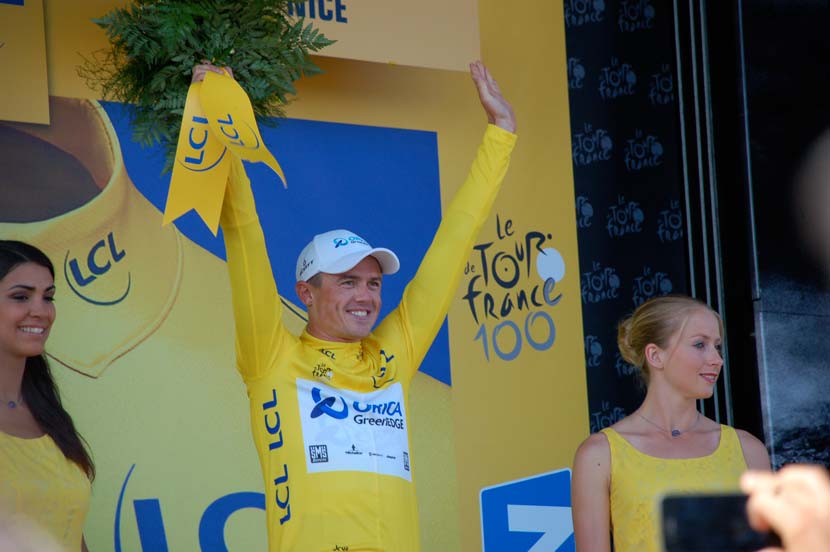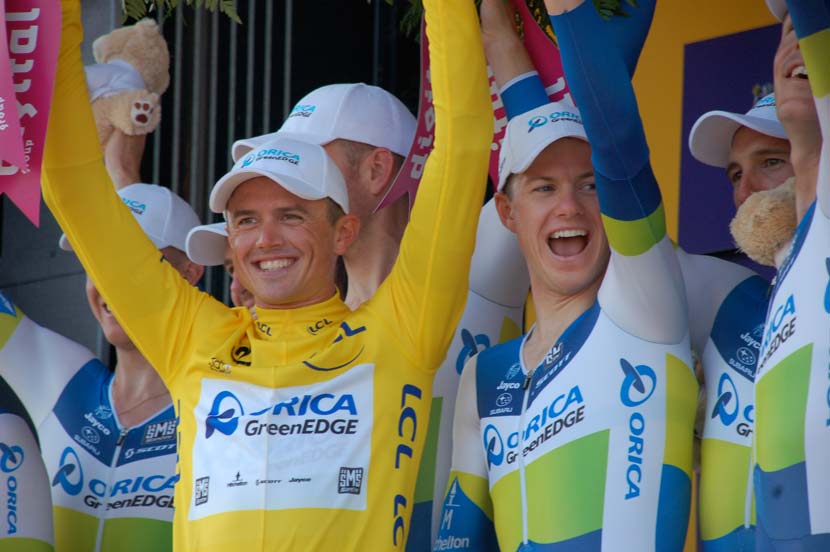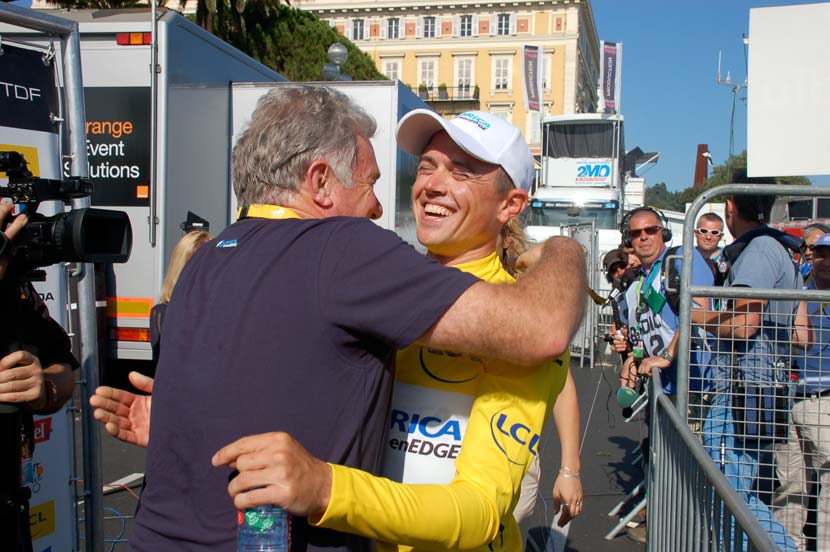With the Orica-GreenEdge line-up for the 2014 Tour de France due to be announced in the coming days we can safely assume that one of the nine will be the Australian champion, Simon Gerrans. The 34-year-old has won three stages of the French race – one in 2008 and two in 2013, including the team time trial which put him in the yellow jersey.
A week after the Tour last year, RIDE caught up with Gerrans to get an overview of the race and some insight into the atmosphere in the team that enjoyed a stellar start to the 100th edition.
Gerrans is on the cover of the current issue of RIDE Cycling Review as the winner of the 100th edition of the Belgian one-day Classic, Liège-Bastogne-Liège. In RIDE #64 we have an exclusive interview with him about that race in April but if you use the search option on ridemedia.com.au you’ll find a collection of stories about Gerrans from throughout his career.
As we await the confirmation of his place in the peloton for the 101st Tour de France, it’s as good a time as any to revisit the discussion about the 2013 race… here is a transcript of that chat with Rob Arnold

Gerrans… his first maillot jaune.
Photo: Rob Arnold
Simon Gerrans interview
[From 31 July 2013]
RIDE: Can we go back and talk about the Tour de France? It’s not always possible to speak properly on the day you win but it was a real buzz for a few days in the first week of the Tour. Do you find that you hark back to those days in your memory now or are you just thinking about the future?
Simon Gerrans: “I guess a mix of emotions. What we’d achieved at the Tour really only sunk in when it was all done and dusted. At the time, you’re just on a high and you’re just sort of riding the waves of what we were doing. And then you get on with the job for the rest of the Tour. It’s only once it’s all over that it sinks in; that’s when I had the chance to recognise what a fantastic Tour de France our team actually had.”
The success was really concertinaed into the first few days. After that, there was the great day for Michael Albasini going to Lyon [stage 14] and there were other moments when we saw GreenEdge being active but that first week was just incredible for you guys.
“Yeah, the first week – our first five or six days – made our entire Tour de France but I’ve learned over the years that the opportunities come fewer and fewer the further you get into the race. If you look at how many opportunistic breakaways went all the way to the finish, obviously there was that one that Albasini was in – and he was only half-a-wheel off getting another stage win… and then there were a couple of days in the mountains and, basically, Rui Costa won those stages. Here was a guy coming off a victory in the Tour de Suisse and he was probably a top 10 contender for the overall. When there’s a guy of that calibre getting in the breaks and winning from there, it’s always going to be hard.
“I’m glad we got the results when we did, in the first part of the race. After that, things got pretty tough.”
Can you tell me how you now see those wins in Calvi and Nice? How different are you now because of that?
“I don’t think I’m a lot different. Obviously what it does, to win at the Tour de France – as I found out back in 2008 – is that it can basically change your career… and your season as well. What it did is that it showed that, on my day, I can mix it up with the best guys in the world. And what the team time trial did as well was show that Orica-GreenEdge is one of the best teams in the world.”
The day in Nice was remarkable on so many levels, especially given what preceded it. I wonder if you celebrated your win before the TTT? What was the sequence in the hotel on those few days?
“Obviously we had the transfer to Nice after I won in Calvi but, when we finally got to the hotel, we all had a drink together.”
What did you drink?
“Oh, we had a glass of Champagne.
“It’s not like we went out partying like you might when you’ve won the Tour de France. We had some pretty big objectives left in the race.
“I wanted to thank everybody once we got to Nice on the night of my stage win. I said to the guys something like, ‘It was a big team effort to win today and I’m honoured to be able to finish the great work off… but one thing I have done is open the floodgates.’
“I think the first win in the Tour de France [for a team] is the hardest one to get and, I said, ‘now that we’ve got that, they’ll come thick and fast from now on…’ We didn’t even have to wait 24 hours until we won the team time trial.
“It meant we were racing the team time trial on a high. No one was really talking about us as favourites but we knew we had a really good, strong, balanced team, and we were racing with no pressure and filled with confidence. It panned out perfectly for us to be able to win the next day.”

Simon and Simon: Gerrans and Clarke on the podium in Nice.
Photo: Rob Arnold
The sequence then continued with your gesture to Daryl Impey who took over the lead of the race from you. You were leading him out and pulled over after your turn and you could see your yellow jersey riding away in the final few hundred metres… Do you remember that sequence now. Have you replayed it on the television and seen what it looks like? What do you recall of that moment?
“I haven’t looked at in on TV to see what happened there but we had plan going into the stage. I said to Daryl, to the directors, and then to the rest of the boys at various times leading into the stage, that that is what I was planning to do. Daryl knew what he had to do and we were basically in a pretty unique situation – where it came down to stage placings because there were no time gaps – and I was able to do that for Daryl. That’s basically whey I decided to do it. I thought, ‘I’ve had a couple of days in the yellow jersey…’ and whether I spent two days or four in the lead was not going to change my life. But I had the opportunity to really change the life – and the career – of one of my best mates within the team. I was really lucky to be able to do that.”
The reference to Rui Costa earlier reminds us that even though Portugal is much closer to France the support from Australian fans was so much more noticeable… “Obviously I don’t go into the media conference unless I’m the one sitting at the front of the room so I don’t really have much to compare it to but there was plenty of media there and it seemed like there was plenty of excitement about my win and then to take the yellow jersey the next day. They were the two times I was in the press room. But… I guess, I don’t really get too much of a feel for what the buzz is like back in Australia apart from what my mates back home are telling me and, obviously, my family as well. But it sounds like it was just out of control and the amount of coverage we were getting was what it deserves.”
The race was bookended by two significant incidents for the team: obviously the bus in Bastia and then Stuart O’Grady’s confession about what he’d done a lot earlier in his career. How did you take the whole package of those three or four weeks in June and July 2013?
“I guess we got plenty of press with the team; in unusual circumstances, fantastic circumstances and a wrong one. It has really been a rollercoaster month and that’s what we’re dealing with, that’s what you cop when you’re involved in professional cycling.”
Quickly and anecdotally, what was going on in your world when the bus incident happened? How did you respond to it?
“We had no idea what was going on with the bus until we finished the stage, we went to the parking lot area and the bus wasn’t there. We were like, ‘Where the bloody hell is the bus?’ Then people were saying, ‘Did you hear what happened with your bus?’ And we were just like, ‘We’ve got no idea what’s going on…’
“It was obviously relayed to the directeurs and what not but at that point in time, in the race, we didn’t have great communication with our race radio so we had no idea during the stage what was going on. It was only afterwards when we got to the hotel that exactly what happened was explained to us.
“It really made worldwide headlines, that little mistake that was made at the end of the stage.”
It must’ve been totally bizarre to be a part of. To then refocus and did what you did on the road to Calvi – which you had done so much reconnaissance for – was cool. Matt Keenan had tweeted before the start of stage three that there were gumtrees lining the finishing straight and that it could be a good omen for you… I’m told you did that course a lot beforehand.
Can you talk about that day and the details of how you saw the sprint? Daryl pulled a hole out of nowhere and you outsprinted Peter Sagan, it must’ve been bizarre to experience…
“Uhm, it was basically a perfectly executed plan. We were down there in Corsica a week before the race and riding the courses from the weekend before the race started. We did that so we could scout stages two and three. So we all knew what we were in for and we really made our plan in advance because we knew it was going to be good for us.
“I led Daryl out in stage two when, unfortunately, we were sprinting for minor placings [behind winner Jan Bakelants] then on stage three the plan was that if, for some reason, Bakelants wasn’t near the front then I was to lead out Daryl again because it was going to be a matter of stage placings for him to potentially take the yellow jersey.
“If Bakelants was in the front and we were sprinting for the win, it was Daryl turn to lead me out.
“We knew the whole stage but, in particular, we knew the final few kilometres. Daryl knew exactly how far out to go from and when to leave me. I put my complete faith in him doing that. He’s probably one of the best lead-out men going around and the fact that he knew the finish so well was always going to be a huge advantage. I let him take me from about the final five kilometres or even a little more. He basically hit the front, I’m not sure how far it was to go – maybe 350 metres or so. I gave him a length or two and then I opened my sprint up with Sagan on my wheel inside the last 200 metres. And obviously I managed to hold him off by less than half a wheel. At the time, I didn’t know if I’d won it or not.”
I was talking about it with Robbie McEwen later that day and it was fun to see the effect that your win had on him and everyone involved with the team.
“I guess, for a lot of people, it was an upset victory as well. In the commentary, you could hear them saying, ‘Yep, this is for Peter Sagan who has got it in the bag…’ that seemed to be the sentiment from a few kilometres to go. So to hold him off… and, as everybody knows his sprinting capabilities, it was definitely a win that shocked quite a few people.”

Gerry Ryan congratulates Gerrans on taking the lead of GC of the 100th Tour after stage four.
Photo: Rob Arnold



